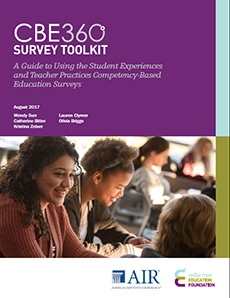CBE 360 Survey Toolkit
 States, districts, and schools that want to realize how competency-based education (CBE) can directly support students’ college and career readiness must move beyond saying they are using CBE strategies—and examine the quality of implementation of core CBE features.
States, districts, and schools that want to realize how competency-based education (CBE) can directly support students’ college and career readiness must move beyond saying they are using CBE strategies—and examine the quality of implementation of core CBE features.
The CBE 360 Survey Toolkit, developed by AIR with support from the Nellie Mae Education Foundation, uses surveys from a recent AIR CBE study to provide a comprehensive picture of CBE implementation in six research-based core areas: learning targets, measurement of learning, instructional approaches and supports, assessment of learning, pacing and progression, and when and where learning takes place. Users can then identify areas of strength and need in order to realize the full potential of CBE.
The CBE 360 Survey Toolkit includes:
- CBE Survey User Guide: A user-friendly guide on administering or adapting the surveys, exploring results, and interpreting and using your findings.
- Toolkit Checklist: A checklist to confirm that you’ve taken all five steps necessary to prepare for survey administration.
- Student CBE Experiences (SCE) Survey: A 20-minute survey designed for middle or high school students that includes questions regarding CBE-related experiences in school.
- Teacher CBE Practices (TCP) Survey: A 20-minute survey designed for academic teaching staff that includes questions on CBE-related practices across all of their courses, schoolwide policies and practices, and more in-depth questions about CBE-related practices in one selected course.
- Surveys Construct Map: A map specifying which survey items and items sets are aligned with each of the six CBE feature areas to help customize surveys for local needs.
- Consent Guidance and Sample Parent/Guardian Consent Form: Example consent forms that can be modified to align with your district or school’s requirements.
- Survey Administration Instructions: Guidelines to help you plan for survey administration including instructions and scripts to ensure a consistent and efficient administration process.
- Technical Appendix: A resources that provides the technical properties for the surveys and details regarding survey development and testing.
